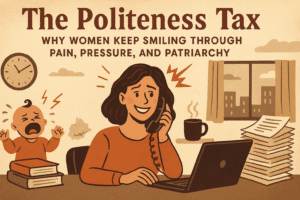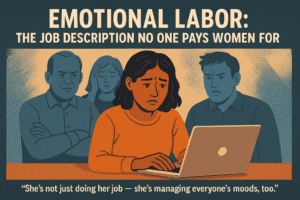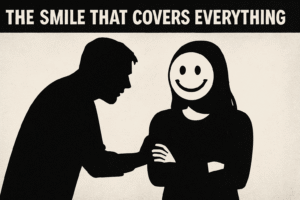 “Smile, Sweetheart”—And Other Weapons Dressed as Compliments
“Smile, Sweetheart”—And Other Weapons Dressed as Compliments
She smiled. Not because she genuinely wanted to, but because the world expected her to. An unexpected pause during a meeting, a forced grin from her boss directed at her, and a dinner conversation that gnawed at her self-esteem like it was dessert—she smiled. Aer all, why shouldn’t she be the one to speak up? Create a stir? Share her thoughts and risk being labeled as dramatic? Ruin the mood? Welcome to the Politeness Tax: the emotional burden women carry to feel safe, be liked, and avoid making anyone, especially men, uncomfortable. It’s a tax that’s quietly but persistently imposed, taken each time a woman suppresses her discomfort with a smile. Society has conditioned women to be gentle, agreeable, and non-threatening. This conditioning shows up in the smallest of moments: the way she laughs at a joke that’s flat, agrees with a hurtful comment, or nods along just to make the discomfort fade. The politeness tax may be invisible, but it extracts everything from her.
Emotional Labor: The Job Description No One Pays Women For
 “She’s not just doing her job — she’s managing everyone’s moods, too.”
“She’s not just doing her job — she’s managing everyone’s moods, too.”
She’s the emotional thermostat in every room she enters. At work, she notices when tensions rise before anyone speaks. At home, she senses the sigh in her partner’s voice before they do. At dinner parties, she fills silences with cheerful small talk so no one feels
awkward. And through it all, she’s smiling — like it’s easy.
But behind that smile is exhaustion.
This is emotional labor. The invisible workload women carry without recognition or rest.
She remembers birthdays, smooths over fights, picks the right words, the right tone, the right moment — constantly editing herself so others can be comfortable.
She plans the team lunch. She makes sure no one feels left out. She texts first to check in. And she’s called “sweet,” never “strong,” because strength — the kind that sacrifices
quietly — often goes unnoticed.
She was told to smile before she learned to say “no.”
Before she even learned to write her own name, the world had already scripted her life:
“Smile for the guests.”
“Don’t be rude.”
“Say thank you, even if you didn’t like it.”
“Be a good girl.”
These weren’t just lessons in manners; they were rehearsals—early training in how to comply.
While boys were celebrated for being bold, loud, and opinionated, girls were rewarded for
being quiet, pleasant, and agreeable. If a girl showed confidence? She was often labeled
“bossy.” Setting a firm boundary? That was “difficult.”
So, she learned to shrink herself into manageable pieces, to wrap every emotion in a smile,
and to silence the inner voice that whispered “no,” because saying it out loud made others
uncomfortable.
This is the reality of female social conditioning—a lifetime of being taught that being
liked is more important than being honest, and politeness is safer than power.
Now, even as a grown woman, she finds herself smiling when she doesn’t truly feel it. Not
because she wants to, but because, somewhere along the way, that smile stopped being
hers.
It morphed into society’s mask—and she’s worn it for so long that it feels like a part of her
skin.
The Smile That Covers Everything (Even Harassment)
 She smiled while saying, “I have a boyfriend,” so he wouldn’t follow her home
She smiled while saying, “I have a boyfriend,” so he wouldn’t follow her home
Here’s the harsh truth about womanhood: a smile doesn’t always mean kindness — sometimes, it’s just a disguise.
TSolaugh after someone makes an unwanted remark? It’s not a sign of encouragement. It’s a silent plea: Please, don’t make this worse.
The polite nod during an uncomfortable conversation? It’s not genuine interest. It’s a calculated move: What’s the safest way to escape this situation?
Women are conditioned to smile to be liked, but often, they smile just to survive. A smile turns into a shield — not against judgment, but against real danger. From the guy who gets upset when turned down. From the boss who overstays his welcome. From the stranger whose compliment feels more like a setup.
Real women carry stories like these deep within them.
Smiling through anxiety on a late-night train.
Smiling when a coworker “accidentally” brushes against their lower back.
Smiling while sitting in a meeting where their ideas go unnoticed — unless echoed by a man.
This isn’t about manners. It’s about survival disguised as sweetness. And behind every forced smile lies a quiet scream:
Don’t provoke him. Don’t make it worse. Just smile. Get home safe.
Smile or Be Labeled: The Corporate Edition
Too soft? She’s weak. Too firm? She’s a problem. Welcome to the “Smile Zone.”
In the workplace, a woman’s expression is never just her own — it’s like a performance review. If she exudes confidence, she’s labeled as “intimidating.” If she’s more reserved, she’s deemed “not leadership material.” Show a little passion, and suddenly she’s “too emotional.” And heaven forbid she forgets to smile — then she’s “cold,” “hard to work with,” or “angry.”
So, she tiptoes through the corporate world in heels, carefully adjusting her tone, choosing her words with caution, and masking her strength with a softer approach. Instead of saying, “You haven’t responded,” she types, “Just following up!” She prefaces her valid points with, “Maybe I’m wrong, but…” and laughs off interruptions, swallowing her frustration while adding emojis to her emails just to come across as friendly enough.
All of this just to maintain her place at the table — a spot she had to fight twice as hard to secure. But what’s the cost? Self-censorship. Emotional fatigue. A voice that feels less and less like her own.
She’s not merely doing her job; she’s curating how the world perceives her — all while wearing a smile, even when it drains her of power.
The Burnout You Can’t See Because It’s Wearing Lipstick
She’s anxious, exhausted, and drowning. But you’d never know — her smile’s perfect.
She seems like she has everything under control. Meetings start right on time, the kids are
well-fed, and her emails are filled with cheerful exclamation points. But behind that
perfect smile? There’s a woman who’s running on fumes.
This is often what burnout looks like for women — not a scene of chaos, but a picture of
competence. Not someone falling apart, but a person holding everything together so
tightly that she can hardly breathe.
She says “yes” when what she really means is “I can’t.”
She shows up, even when her body is screaming for a break.
She’s always there to answer, support, fix, and plan for everyone except herself. Why does she do this? Because being “the reliable one” has become her whole identity.
Because at some point, asking for help started to feel like a sign of weakness. Because society rewards her for being perfect, not for being real.
So she layers on mascara to hide the sleepless nights. She shares the smiling selfies.
And when someone asks how she’s doing, she responds without thinking:
“I’m fine.”
But deep down, she’s not fine. She’s mastered the art of pretending.
What If She Just… Didn’t Smile?
What if she let the silence sit? Let the “no” stand? Let her eyebrows not stay polite?
Imagine a world where women could take off their masks. A place where they could
confidently say “no” without worrying about hurting someone’s feelings. Where they could
relax their expressions without being bombarded with questions about what’s wrong.
What if a woman’s face truly belonged to her, rather than being shaped by the comfort of
others?
Reclaiming emotional boundaries is an act of defiance. It’s empowering. It’s essential.
Being authentic should never come with a sense of danger.
Conclusion — Smiles Shouldn’t Be Survival Skills
She’s exhausted. Not from the work she does, but from the weight she carries while smiling
through it. The weight of being pleasant, palatable, professional, and polite in every room she
enters. Of shrinking her truth so others feel more comfortable.
But here’s what no one tells her: her worth was never meant to be measured in smiles.
She’s allowed to say no without softening the blow.
She’s allowed to take up space without apologizing.
She’s allowed to stop performing nd start existing.
Because a woman’s face is not public property. Her emotions aren’t liabilities. And her silence, her
smiles, her careful word choices — those weren’t just manners. They were survival tactics in a
world that taught her that being liked is safer than being real.
But she’s unlearning now.
Unmasking.
Unapologetically.
Because her face was never meant to wear fear.
It was meant to show the truth.
And she’s finally ready to live without owing anyone a smile.

